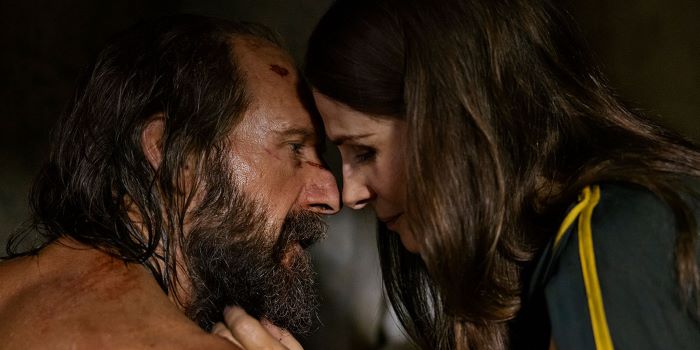![]() Breathing new life into a well-known myth means daring to tell it as though it has never been heard before. With his latest film, Uberto Pasolini (yes, the nephew of Pier Paolo) fully embraces the limitless potential of Greek mythology to craft a captivating narrative, specifically drawing from the epic tales of The Iliad and The Odyssey. Undeterred by centuries of familiarity and the omnipresent influence of these works, Pasolini approaches the material boldly.
Breathing new life into a well-known myth means daring to tell it as though it has never been heard before. With his latest film, Uberto Pasolini (yes, the nephew of Pier Paolo) fully embraces the limitless potential of Greek mythology to craft a captivating narrative, specifically drawing from the epic tales of The Iliad and The Odyssey. Undeterred by centuries of familiarity and the omnipresent influence of these works, Pasolini approaches the material boldly.
The Return wisely focuses on the final chapter of an epic journey that hardly needs an introduction, plunging straight into the human core that sustains The Odyssey amid its inherent fantasy and spectacle: a soldier longing to return home after years of extraordinary adventures filled with obstacles and loss; the faithful wife who has waited for him all that time; and the son who has grown up practically orphaned, burdened by the shadow of his father’s legendary and unattainable heroism.
In a world where gods intervene directly in the lives of men, treating them as mere toys of fate, the characters in The Odyssey are almost defiant rebels, refusing to succumb to inevitability and trusting that a different outcome awaits them. Pasolini’s film embraces this from the outset, presenting an aged Odysseus (Ralph Fiennes) lying naked and semi-conscious on Ithaca’s shores. The great hero has finally returned home after the Trojan War and a decade of wandering, unable to find his way back. In Homer’s original tale, Odysseus was cursed by the god Poseidon during his journey (and delayed by encounters with monsters or extended stays with goddesses who became his lovers). However, in this version, no explicit reasons for his late arrival are given, leaving us to interpret them as the lingering physical and mental scars of a veteran haunted by the horrors of war.
Odysseus finds Ithaca a hostile place, populated by hungry, miserable inhabitants who mistake him for another vagrant roaming a once-prosperous land now plundered by lords and princes vying for his wife’s hand. The community insists on treating Penelope (Juliette Binoche) as a widow. She has resisted the pressure to remarry by holding onto her faith that Odysseus is alive and will return, cleverly delaying the suitors by refusing to choose one until she finishes weaving a shroud for her father-in-law, Laertes. The well-known trick? What she weaves by day, she unravels by night. Meanwhile, the suitors, acting like gangsters, exploit the island freely, spreading cruelty and violence. Antinous (Marwan Kenzari) positions himself as the most viable option for Penelope, promising to ensure her safety and protect her son. Telemachus (Charlie Plummer), the daring prince of Ithaca, resents his mother’s incomprehensible waiting, fears the suitors’ constant threats, and harbors bitter memories of the father who abandoned them.
The Return faithfully assembles the key pieces of the epic tale centered on the hero’s homecoming and reclaiming of his island. The results are unexpectedly moving, particularly in the reenactment of many iconic moments: Odysseus discovering his father (who swore not to die until his son touched Ithaca’s soil) recently deceased, his dog Argos dying at his touch, and his servant Eurycleia recognizing his childhood scars while washing him. Yet, Pasolini—co-writing the adaptation with Edward Bond and John Collee—imbues the story with fresh cinematic life, making it visceral and suspenseful even when we know the ending. He ensures that every layer of the narrative’s emotional weight is deeply felt.
Pasolini’s approach also carries a distinct sensuality that would have intrigued his filmmaker uncle: the relaxed contemplation of the male anatomy, the occasional full-frontal nudity, and the athletic bodies draped in suggestive togas. At the same time, the director has a critical understanding of violence as hollow spectacle, particularly evident in the climactic sequence where Odysseus and Telemachus confront the suitors. This showdown is depicted not as a triumphant act of revenge but as a bitter, trance-like moment that inevitably taints the soul.
Eschewing the gods, monsters, battles, and underworld descents that precede it, The Return offers a more modest and intimate approach to Homer’s legacy. Pasolini’s retelling rewards viewers with profound psychological depth. The film’s authenticity is heightened by its Greek locations, Marius Panduru’s evocative cinematography, and inspired casting. Reuniting decades after Wuthering Heights and The English Patient, Fiennes and Binoche deliver electrifying chemistry. The long-awaited reunion of Odysseus and Penelope mirrors the anticipation of seeing these two powerhouse performers share the screen again. You won’t be disappointed, as this is not just a love story but also one of forgiveness. Fiennes, in the same year as Conclave, showcases his immense range in a physically demanding role, embodying an aging man capable of rekindling the strength and courage of his youth.
In short, you can never go wrong with one of the greatest stories ever told. Yet, unlike previous kitschy and surface-level adaptations, Pasolini’s take feels fresh and new on the big screen.







Leave A Comment